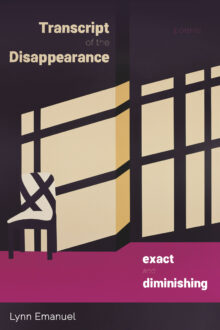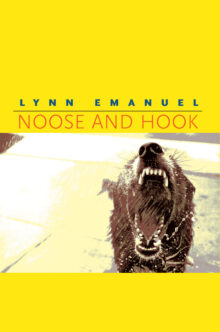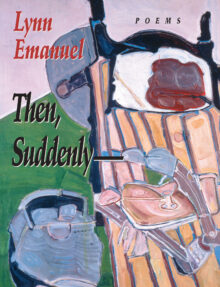
Lynn Emanuel
Lynn Emanuel is the author of Noose and Hook, Hotel Fiesta, The Dig, Then, Suddenly, and most recently, The Nerve of It, which received the Lenore Marshall Award from the Academy of American Poets. Her work has been collected numerous times in Best American Poetry and included in The Oxford Book of American Poetry. She has been published and reviewed in the New York Times Book Review, the New York Review of Books, the Los Angeles Review of Books, BOMB Magazine, Poetry, and Publishers Weekly. She has been a judge for the National Book Awards and has taught at many venues including the Warren Wilson Program and the Bread Loaf Conference.
Transcript of the Disappearance, Exact and Diminishing
Poems
Lynn Emanuel’s sixth collection of poetry is not sequential or straightforward. It has no conventional chronology, no master narrative. Instead, it is a life story, with all the chaos and messiness entailed therein. Transcript of the Disappearance, Exact and Diminishing is a commotion of grief and wit, audacious images, poems, and paragraphs. It explores and centers on the possibilities and limitations of art in the face of disappearances of many kinds, including the disappearance that is most personal—the poet’s own.
—PLAGUE’S MONOLOGUE
I erased the world so nothing can find it, snuffed out the roses, red and hot
as the snouts of bombs, repealed the polar ice cap, even that fat oxymoron,
the “industrial park,” has disappeared. And the last few words huddled
together, like bees in a hive buzzing and plotting? I cut their throats
with the scythe of a comma, turned the snout of my pen against them.
I saved by erasing the streets and the people—let them be overgrown
with absence. I don’t care—there is no limit to my appetite, my lust,
my zeal for emptiness. But I know you—and you have kept a transcript
of the disappearance.
The Nerve Of It
Poems New and Selected
Winner of the 2016 Lenore Marshall Poetry Prize from the Academy of American Poets Emanuel’s version of a “new and selected poems” turns convention on its head. She ignores chronology, placing new poems beside old, mixing middle and early poems with recent work, and liberating all her poems from the restraints of their particular histories, both aesthetic and autobiographical. Whether writing in the comedic drag of the cartoon strip, or investigating the Mobius strip relationship between reader and writer, or exposing the humor and hurt that accompany visitations from Frank O’Hara and Gertrude Stein, The Nerve of It both stings and pleases with its intelligence, wit and vivacity. It breaks through, in ways that are bold, sexy, haunting and wry, the die-hard opposition of new and old, personal narrative and linguistic play, sincerity and irony, misery and hilarity. Open the book. Something new is happening here.
Noose and Hook
“I have long believed that Lynn Emanuel is one of the most innovative and subversive poets now writing in America. Her aesthetic and artistic choices consistently invoke a complex hybrid poetics that radically reimagines the shape of our poetic discourse. The brilliant, shattering, and disturbing poems of Noose and Hook are not only wry critiques of recent poetic and cultural activity in this country but also compelling signposts to what yet might be possible in our future. This is Lynn Emanuel's most exquisite and powerful book yet.”—David St. John
Then, Suddenly–
Finalist for ForeWord Magazine’s 1999 Poetry Book of the Year
A reader and a writer don their respective roles and embark on the journey of a book. This is their story–ultimately a love story–darkly funny, mournful, testy. It is about a reader who at times presides over the page like a god, and at others follows the leash of the author's voice through the dark streets of the book like a dog, and it is about a writer of determined slipperiness. As we read, we think that each of us is The Reader, the one who knows the Real Story. But the more we think we understand, the more the story moves away from us—all is not what it seems.
This eagerly awaited third volume by the poet whose work The New York Times described as “at once charmed and frightening” is a book of high-spirited subversiveness, a work of argument, seduction, and a relentless devotion to language. Then, Suddenly— bristles with the sound of the author's voice–insistent, vital, hilarious, and iconoclastic–tearing away at the confinement of the page and at the distance between the page and the reader. Emanuel's images are dazzling. She creates a performance that is fearsome and funny in its portrayal of the argument between the work of the text and the world of the body. The Gettsyburg Review has called her a writer of “exquisite craftsmanship” who can “strike from language . . . images chiseled clean as bas-relief.” Then, Suddenly— is a book of spectacle and verve, part elegy, part vaudeville.




